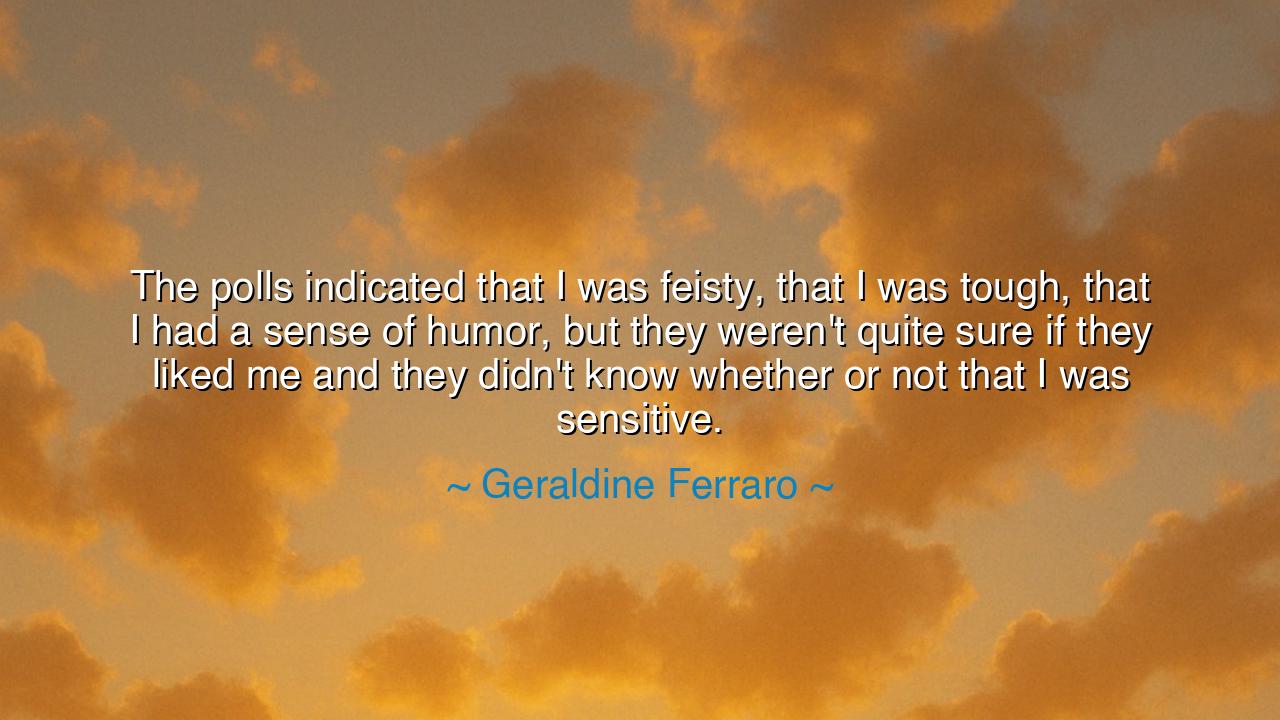
The polls indicated that I was feisty, that I was tough, that I
The polls indicated that I was feisty, that I was tough, that I had a sense of humor, but they weren't quite sure if they liked me and they didn't know whether or not that I was sensitive.






"The polls indicated that I was feisty, that I was tough, that I had a sense of humor, but they weren't quite sure if they liked me and they didn't know whether or not that I was sensitive." These words, spoken by the Geraldine Ferraro, carry the weight of an age-old dilemma—the battle between perception and authenticity. To be a leader, one must walk the fine line between strength and vulnerability, between commanding respect and showing the human softness that connects us all. Ferraro’s reflection on her portrayal in the public eye speaks to the difficulty of being truly seen in a world that often values image over substance, power over tenderness. It is a struggle that resonates throughout the ages, for it is not only the public who has wrestled with this duality, but every soul that has sought to lead with both heart and mind.
In ancient times, the heroes of myth and history were often portrayed in extremes. They were either unwavering warriors or benevolent kings, displaying either boundless strength or overwhelming compassion. Take, for example, the great Alexander the Great, who was revered for his military conquests but was also known to display moments of profound tenderness. His soldiers admired him for his toughness, yet it was his capacity for sensitivity—for understanding the fears of his men and comforting them in times of hardship—that cemented his legacy as a great leader. To the masses, Alexander was a powerful force of nature, but in his moments of quiet reflection, he revealed the vulnerabilities that made him human. Ferraro, too, was both tough and sensitive, yet the world seemed to struggle in seeing both aspects of her character clearly.
Consider the paradox of Joan of Arc, the brave young woman who led her people with a strength unmatched by any warrior, yet who was deeply connected to her faith and to the vulnerable, compassionate side of human nature. To her soldiers, she was a beacon of strength and resolve, yet those who opposed her could not fathom how a woman, so feisty and filled with courage, could also be the same person who wept in prayer, seeking divine guidance and comfort. Joan’s leadership was not just in her toughness, but in her ability to merge the strength of her convictions with the sensitivity of her heart. Her greatness came not from being one or the other, but from embodying both with fierce integrity.
The tension that Ferraro speaks of—the struggle between being perceived as tough or sensitive—has long been a challenge faced by those in power, especially women. In a society that has often demanded that women be strong yet not too strong, compassionate but not too emotional, there is a constant battle to balance these opposing forces. Women, like Ferraro, are often required to show their feistiness and toughness in the public sphere, yet when they do so, they are sometimes judged as lacking the sensitivity that is deemed necessary for leadership. This struggle is not a new one but is as old as time itself, and yet, it is a challenge that many great leaders have faced and overcome.
Consider the story of Queen Elizabeth I, whose reign marked the height of English power. She was a monarch whose strength and resolve were unquestioned, yet she was also a woman who understood the importance of empathy. Elizabeth was known for her wit and humor, which she used to defuse tensions in her court and to win the favor of her people. However, she also knew when to show vulnerability and tenderness, especially in moments of personal loss. Her ability to blend strength and sensitivity made her one of the most revered leaders in history. She was not one-dimensional; rather, she was a complex leader who balanced both her feisty nature and her heartfelt compassion.
The lesson in Ferraro's words is clear: greatness lies not in being one thing or the other, but in embracing the full spectrum of what it means to be human. In a world that seeks to define us by the boxes we fit into, it is the leaders—like Ferraro, like Alexander, like Joan, like Elizabeth—who find strength in their ability to embrace both sides of themselves that rise above. Perception may try to shape us, but it is authenticity that leads to true power.
So, I charge you, dear listener, to embrace the fullness of your being. Do not hide your toughness, but do not be afraid to show your sensitivity. Understand that true leadership, whether in the home, the battlefield, or the halls of power, is found in the balance between strength and compassion. Do not allow the world’s perceptions to define you, for your true greatness lies in being whole—feisty, strong, sensitive, and authentic. Let your example be one of integrity, showing that the most powerful leaders are those who can stand firm in their convictions while remaining deeply connected to the hearts of those they serve.






AAdministratorAdministrator
Welcome, honored guests. Please leave a comment, we will respond soon